Feature Stories
Life game stimulates self-reflection on goal setting and life planning
CDF project operators provide project participants, their parents and mentors, on a regular basis, training and guidance on areas such as financial planning, communication skills and life planning. This is to ensure participants receive adequate support throughout their personal development and can complete all the key components of the project.
In July 2016, four NGO operators, namely Baptist Oi Kwan Social Service, Christian Action, Industrial Evangelistic Fellowship and Urban Peacemaker Evangelistic Fellowship, for the first time, jointly organised a training activity for their CDF participants. Almost 200 of them took part in Lifegame, a three-day and two-night training camp led by the Ministry on the Rock. Lifegame is conducted in a form of life simulation game, where players have to deal with various challenges, setbacks and opportunities that may come up during their "lifetime". The experience gained from the game will inspire players to reflect on their life goals, helping them to understand the importance of life planning.
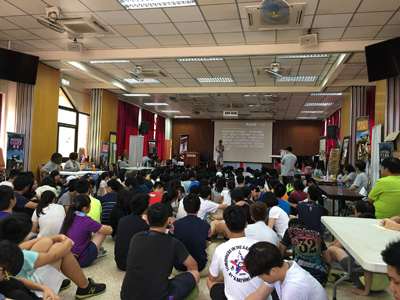 CDF participants from four NGO operators joining the Lifegame.
CDF participants from four NGO operators joining the Lifegame.
The Lifegame happens in a place called "Free City" of which all players are its citizens. Each player is given, on a random basis, an identity, a social status and some assets. Some may be born rich and can inherit a large estate, while some others may be from underprivileged backgrounds, with high educational qualifications but live in poverty.
Like the real world, the "Free City" comprises local communities, government authorities, public organisations, private companies, shops and restaurants, schools, religious institutions and places of entertainment to cater for the daily needs of its citizens.
The time span of the game starts from 2020 and ended in 2055. In other words, the lifetime of each player covers a period of 35 years in the three days and two nights, and a player ages five years for every two hours in real time. In the game, each player has to go through different stages of life, such as taking examinations, making career choices, starting businesses, getting rich, going bankrupt, getting married, experiencing divorced, having children, facing retirement, illness and even death. How the game of a player ends depends very much on the choices the player makes during his/her lifetime. For example, when players look for jobs in the game, some of those with higher educational qualifications may expect a higher salary, but some may simply base their choices on their interests and dreams. For those with lower educational qualifications, job opportunities available for them may be fewer but they can pursue further study as a working student so as to improve their upward mobility.
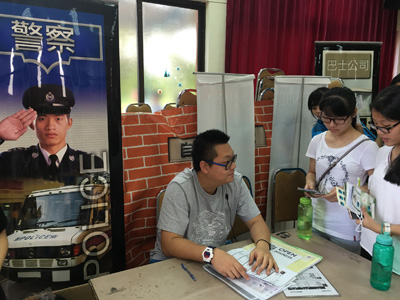 Participants attending a police job interview in the "Free City".
Participants attending a police job interview in the "Free City".
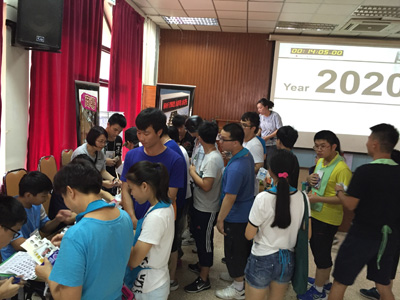 Participants queuing for daily necessities and entering records into their log books.
Participants queuing for daily necessities and entering records into their log books.
The game also gives players an opportunity to learn about wealth management. Wages are the main source of income in the "Free City". Having said so, income can also be obtained through inheritance, dividends and investment returns. Apart from paying for their living expenses, players have to set aside a portion of their income as contingency money for meeting the needs which may arise at different life stages during the game. They also have to record all their expenses on their individual log books and a balance sheet will be generated for each player at the end of the game.
Participants enjoyed the game very much and have learnt a lot from it.
What they say…
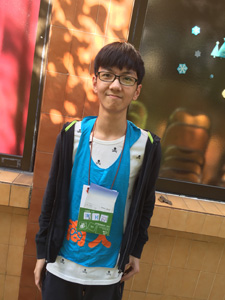 YIU Ka-wing
a CDF participant of Urban Peacemaker Evangelistic Fellowship's "Walk Together-We are Peacemaker" project (Tseung Kwan O) was a grassroots citizen in the game. In a stroke of luck, he inherited a large sum of money which allowed him to start his own business. He was supposed to lead a wonderful life. "I went through all the ups and downs in the game. I was once a student in need but somehow became a rich businessman. In my late middle years, I spent most of my time on investing in the stock market. I made money very easily from my investment but my life was boring and meaningless. At the end of the game, there was nothing in my life report except money. It is not the life I want to live." "The game makes me realise that life is full of challenges. I also notice that as the game progresses, my difficulties increase with age. If I can play the game again, I will spend more time on studying and learning new things. I will not live just for making money." |
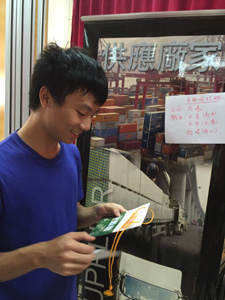 CHEUNG Ka-ho
is a CDF participant of Industrial Evangelistic Fellowship's "Vision Is Possible: The voyage of love and dream" project (Shum Shui Po). He was an upper secondary student from grassroots background in the game. With the educational level he attained, he was determined right from the beginning to embark on a nursing career which he believed would offer him better promotion prospects, but he was unable to do so due to fierce competition. Finally, he joined a supplier company as a clerk. Nevertheless, the setback gave him an unexpected opportunity to change the fate of his community. "In the game, I was a grassroots citizen with upper secondary educational level, and I remained a supplier until the end. I worked very closely with my fellow community members, and together we created many business opportunities of mutual benefits. At the end of the game, all members in our community were able to move out of poverty." "The game taught me that there can be an endless list of things you want to do, but life is short. There were many things I wanted to accomplish in the game but at the end, I could finish only very little of them. I have also learnt that once you have made up your mind to do something, you have to do your best and go for it. Otherwise, there may not be another chance." |
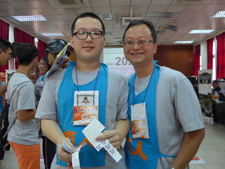 LEUNG Siu-nam (left)
is a participant of Baptist Oi Kwan Social Service's "Step Up 4 — Life Guiding" Project (Kowloon City and Yau Tsim Mong). He was a businessman with diploma qualification and was given a large fortune when the game started. With the fortune at his disposal, there was no need of him to look for jobs like other participants. The fortune also allowed him to lead a lavish lifestyle. As a result, he fell into bad company.
"I'd rather give up being a businessman if I could replay the game. I would have started from the bottom and looked for a job on my own. Through the job-seeking process, I could gain valuable experience and enhance my various capabilities. I have learnt that life is full of unexpected surprises and you have to get prepared for them. For example, we should make savings on a regular basis to allow for contingencies. Moreover, it is very important to choose the right friends because they will stand by you and help you make the correct decision." |
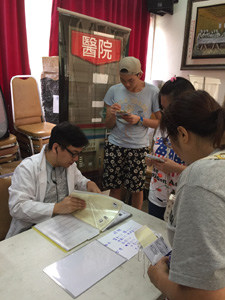 TU Jonathan Yiu-yen
(on the right with a hat) is a participant of Christian Action's "Teen" Generation Project (Kwun Tong). As a university graduate, he was one of the few citizens with high educational qualification in the game. He wanted to become a healthcare worker but failed the interview. He ended up working as a hospital security staff, a post which only required upper secondary qualifications.
"My life in the game was too fast-paced. I was rich and wealthy when the game came to an end, but I had not allowed myself the time to slowly experience what life was all about. I also completely overlooked the importance of slowing down my pace so that I can think about and plan for my next move. These are the things I have to bear in mind in the future." |
There is no 'take two' in the real world but the game gives everyone a second chance," said Mr Stanley LAW, Project Co-ordinator of the Urban Peacemaker Evangelistic Fellowship, after the activity.
"The experience and insights the participants gained from the game can inspire them to think about the meaning of life, and help them prepare for similar situations in the future. We are glad to see that all of them are able to learn something useful for their life planning."